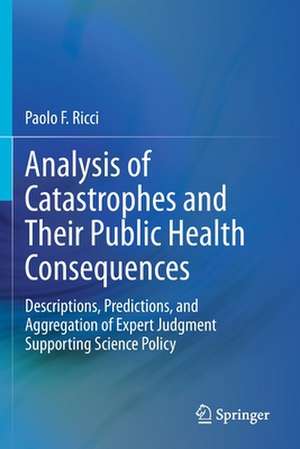Analysis of Catastrophes and Their Public Health Consequences: Descriptions, Predictions, and Aggregation of Expert Judgment Supporting Science Policy
Autor Paolo F. Riccien Limba Engleză Paperback – aug 2021
The author aggregates and fuses scientific information and knowledge in public health policy-science using alternative but complementary methods. The book first focuses on the analysis of catastrophes and commonplace events; the focus then shifts to causal models of multifactorial diseases, particularly at low doses or dose-rates, associated with these events. Topics explored among the chapters include:
- Policy and Legal Aspects of Precautionary Choices
- Catastrophes, Disasters, and Calamities: Concepts for Their Assessment
- Uncertainty: Probabilistic and Statistical Aspects
- Aggregating Judgments to Inform Precautionary Decision-making
Analysis of Catastrophes and Their Public Health Consequences is a text that should engage students, instructors, and researchers in public health, science policy, and preparedness research, as well as serve as a useful resource for policy analysts, practitioners, and risk managers.
| Toate formatele și edițiile | Preț | Express |
|---|---|---|
| Paperback (1) | 364.17 lei 6-8 săpt. | |
| Springer International Publishing – aug 2021 | 364.17 lei 6-8 săpt. | |
| Hardback (1) | 371.10 lei 6-8 săpt. | |
| Springer International Publishing – 31 iul 2020 | 371.10 lei 6-8 săpt. |
Preț: 364.17 lei
Preț vechi: 383.33 lei
-5% Nou
Puncte Express: 546
Preț estimativ în valută:
69.69€ • 73.09$ • 58.01£
69.69€ • 73.09$ • 58.01£
Carte tipărită la comandă
Livrare economică 01-15 aprilie
Preluare comenzi: 021 569.72.76
Specificații
ISBN-13: 9783030480684
ISBN-10: 3030480682
Pagini: 187
Ilustrații: XXII, 187 p. 53 illus., 24 illus. in color.
Dimensiuni: 155 x 235 mm
Greutate: 0.3 kg
Ediția:1st ed. 2020
Editura: Springer International Publishing
Colecția Springer
Locul publicării:Cham, Switzerland
ISBN-10: 3030480682
Pagini: 187
Ilustrații: XXII, 187 p. 53 illus., 24 illus. in color.
Dimensiuni: 155 x 235 mm
Greutate: 0.3 kg
Ediția:1st ed. 2020
Editura: Springer International Publishing
Colecția Springer
Locul publicării:Cham, Switzerland
Cuprins
Chapter 1. Black Swans, dragon-kings, and Other Catastrophes: Caught Between Infinitesimals and Googols.- Chapter 2. Policy and Legal Aspects of Precautionary Choices.- Chapter 3. Catastrophes, Disasters, and Calamities: Concepts for Their Assessment .- Chapter 4. Catastrophic Incidents: Critical Information and Knowledge.- Chapter 5. Uncertainty: Probabilistic and Statistical Aspects.- Chapter 6. Preferences, Choices and Probabilistic Dominance: An Overview.- Chapter 7. Heterogeneous and Uncertain Knowledge: Beyond Probabilities.- Chapter 8. Aggregating Judgments to Inform Precautionary Decision-making.
Recenzii
Notă biografică
Paolo F. Ricci, PhD, LLM, is a professor at the EU's Erasmus Mundus Programs in Italy, Spain, and Portugal. Previously he was a professor at the School of Public Health at the University of Massachusetts at Amherst; professor at Holy Names University in Oakland, California, USA; visiting professor at Xiamen University in China; and, professor at University of Bologna in Italy. For more than 30 years, Dr. Ricci -- a senior Fulbright scholar (specialist, 2010-2015) and appointed peer reviewer for Fulbright Specialists selection (2013-2014) -- has led qualitative and quantitative analyses in public health and epidemiology and conducted experimental work in, among other countries, the United States, Canada, Italy, Australia, France, Vietnam, China, the Ivory Coast, and the European Union. He was the head of the Environmental Technologies Clearinghouse of the IEA/OECD (with full diplomatic status) and has served as a peer reviewer of U.S. Department of Energy (DOE) activities regarding human health risks from past nuclear weapons tests at the Nevada Test Site. Until 2014, Dr. Ricci was an associate editor of the journal Environment International for more than 15 years.
Textul de pe ultima copertă
Public health policy prospectively and retrospectively addresses the consequences of events ranging from the commonplace to the catastrophic. Informing policymakers and stakeholders by enhancing their understanding of complex causation to justify remedial or precautionary actions is a critical science-policy task. In this book, the key aspects of catastrophes (regardless of their nature) and routine events are identified through a common framework for their analyses, and the analyses of the consequences associated with the potential occurrence of these events also are discussed. The book is not about disaster planning; instead, it is focused on analysis and causation in the context of informing – rather than formulating – public health policy.
The author aggregates and fuses scientific information and knowledge in public health policy-science using alternative but complementary methods. The book first focuses on the analysis of catastrophes and commonplace events; the focus then shifts to causal models of multifactorial diseases, particularly at low doses or dose-rates, associated with these events. Topics explored among the chapters include:
Analysis of Catastrophes and Their Public Health Consequences is a text that should engage students, instructors, and researchers in public health, science policy, and preparedness research, as well as serve as a useful resource for policy analysts, practitioners, and risk managers.
The author aggregates and fuses scientific information and knowledge in public health policy-science using alternative but complementary methods. The book first focuses on the analysis of catastrophes and commonplace events; the focus then shifts to causal models of multifactorial diseases, particularly at low doses or dose-rates, associated with these events. Topics explored among the chapters include:
- Policy and Legal Aspects of Precautionary Choices
- Catastrophes, Disasters, and Calamities: Concepts for Their Assessment
- Uncertainty: Probabilistic and Statistical Aspects
- Aggregating Judgments to Inform Precautionary Decision-making
Analysis of Catastrophes and Their Public Health Consequences is a text that should engage students, instructors, and researchers in public health, science policy, and preparedness research, as well as serve as a useful resource for policy analysts, practitioners, and risk managers.
Caracteristici
Is the first book to address these issues in a single volume Addresses an essential understanding of the effects of catastrophes, from slow to fast (climate change to earthquakes), as well as of diseases such as cancer, in the context of science policy Covers key analytical aspects of information and knowledge relevant to science policy Shows the commonalities among analyses of seemingly diverse events and outcomes
